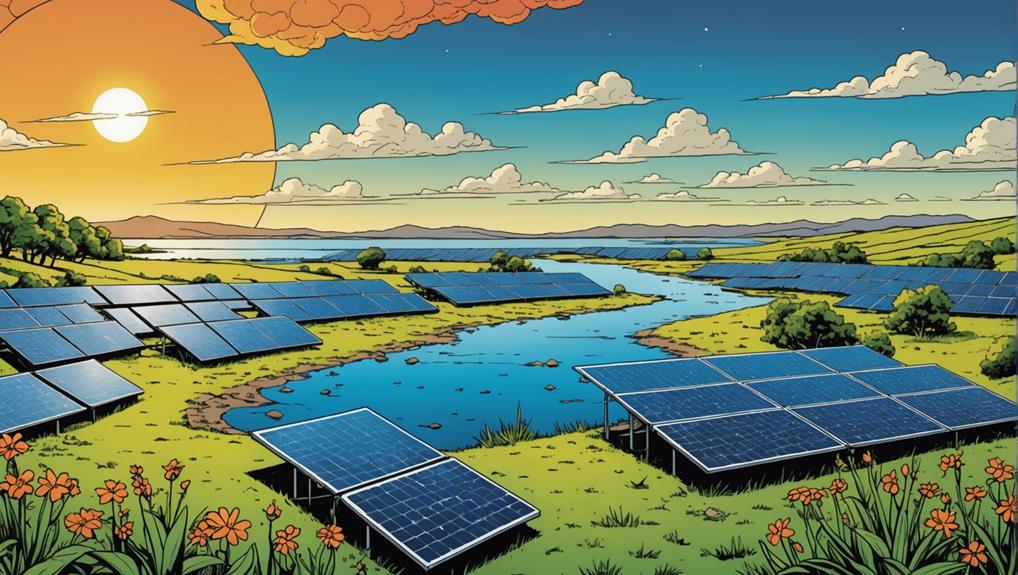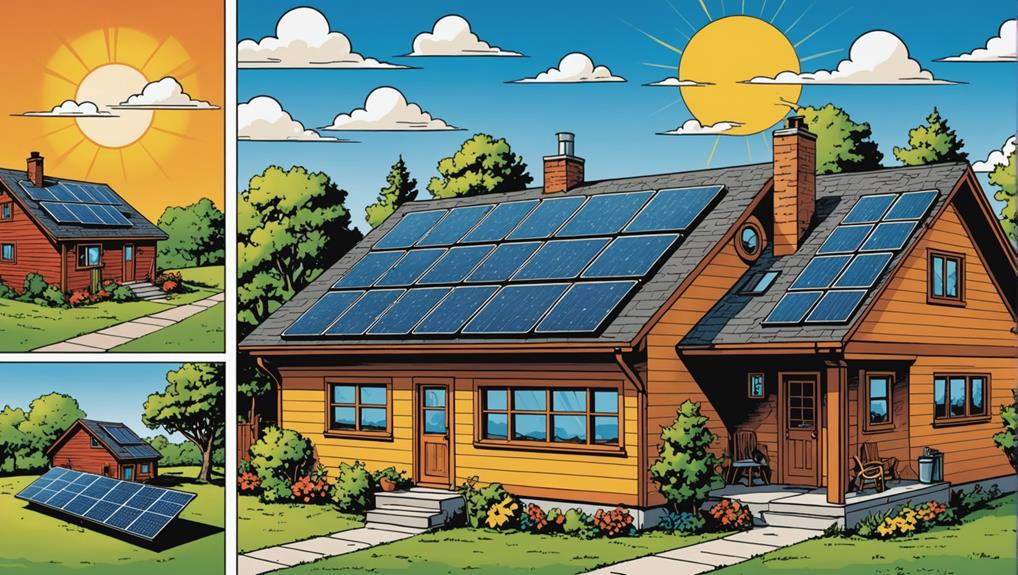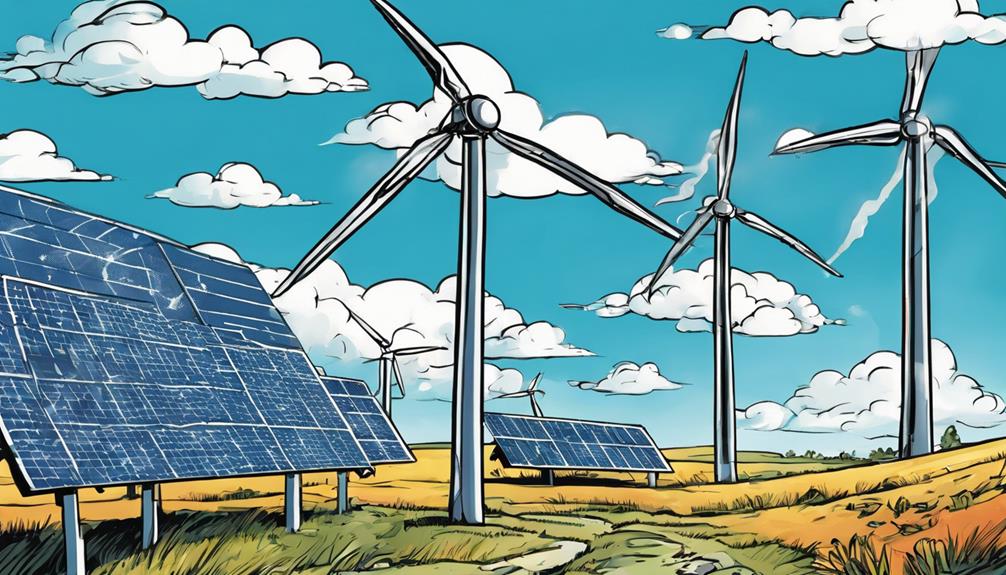Solar energy benefits Earth's land and water by cutting carbon emissions, conserving water, and supporting eco-friendly practices. It helps preserve land, fosters biodiversity, and promotes sustainability for a greener future. These positive impacts show how solar energy plays an essential role in the health of the planet's ecosystems.
Key Takeaways
- Solar energy reduces land use by utilizing rooftops and unused land.
- Photovoltaic solar panels require minimal water for electricity generation.
- Advancements in dry-cooling technology minimize water consumption in solar energy production.
- Solar energy promotes sustainable practices, aiding in land and water conservation.
- Solar power reduces the need for land-intensive fossil fuel extraction, preserving natural landscapes.
Solar Energy's Impact on Earth's Climate
Solar energy's impact on Earth's climate is significant due to its ability to reduce carbon dioxide emissions and mitigate global warming. By harnessing renewable energy from the sun, solar power plays an essential role in combating climate change.
Traditional energy sources like coal and natural gas release greenhouse gases into the atmosphere, exacerbating global warming. In contrast, solar panels generate electricity without emitting any greenhouse gases, making them an environmentally friendly choice.
The adoption of solar energy helps to decrease the carbon footprint associated with electricity production. This reduction in carbon emissions is vital for preserving Earth's climate for future generations.
Solar Energy and Water Resources

Conserving water resources is a key advantage of utilizing solar energy for electricity generation. Solar energy reduces water usage in comparison to traditional energy sources, aiding water conservation efforts. Photovoltaic solar panels are environmentally friendly in water-scarce regions due to their minimal water requirements. While solar thermal power plants use water for cooling, advancements in dry-cooling technology help minimize water consumption. These water-saving benefits of solar energy contribute to sustainable practices and alleviate strain on freshwater resources. By promoting solar energy adoption, the burden on water resources for energy production can be lessened, supporting a more sustainable water-energy nexus.
| Key Points | Details |
|---|---|
| Water usage reduction | Solar energy reduces water usage in electricity generation processes. |
| Solar panels advantages | Photovoltaic solar panels require minimal water, ideal for arid regions. |
| Solar thermal innovation | Advancements in dry-cooling technology minimize water use in solar thermal power plants. |
| Water conservation | Solar energy aids in water conservation efforts for sustainable practices. |
| Freshwater resource support | Promoting solar energy helps alleviate strain on freshwater resources. |
Solar Energy's Role in Land Preservation
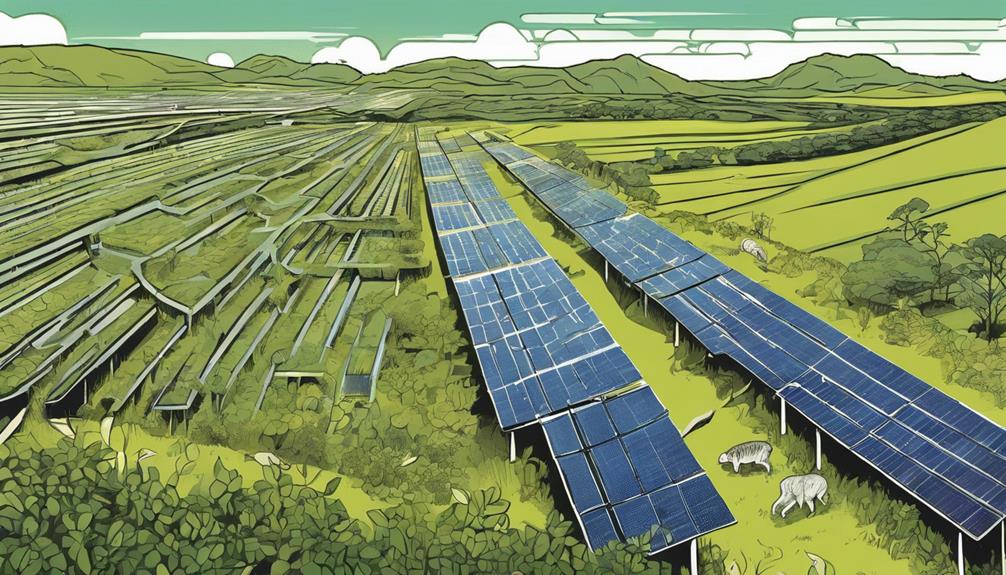
You can explore how solar energy contributes to land preservation through reducing the need for land-intensive fossil fuel extraction, protecting natural habitats.
Solar panels can be strategically placed on rooftops and unused land, minimizing disruption to ecosystems and agriculture.
Additionally, solar power's emission-free generation aids in conserving land and promoting sustainable practices.
Land Conservation Benefits
Through the utilization of underutilized spaces and the promotion of distributed generation, solar energy plays an important role in preserving land for future generations. Here are four key ways solar energy contributes to land conservation benefits:
- Utilizing Existing Spaces: Solar energy development can repurpose rooftops, parking lots, and brownfields for installations, reducing the need for new land use.
- Promoting Distributed Generation: By decentralizing energy production, solar power minimizes the demand for large land areas typically required by centralized power plants, helping protect natural habitats.
- Supporting Agrivoltaics: Solar projects can integrate with agricultural activities, known as agrivoltaics, optimizing land use efficiency and supporting food production while generating clean energy.
- Preserving Biodiversity: Solar energy minimizes land disturbance, safeguards ecosystems, and contributes to the protection of biodiversity, ensuring valuable landscapes for future generations.
Solar energy's land conservation benefits not only help combat climate change but also contribute to maintaining healthy ecosystems and open spaces for various purposes.
Water Resource Protection
Solar energy plays a significant role in land preservation by also contributing to the protection and conservation of water resources. Unlike traditional energy sources, solar energy systems have minimal impact on water resources, benefiting water-stressed regions and preserving water quality.
By reducing the need for water-intensive cooling processes used in fossil fuel extraction, solar energy helps in conserving freshwater resources. This reduction in water consumption aids in overall water resource protection, ensuring the availability of clean water for ecosystems and communities.
Additionally, by utilizing rooftops and small areas for solar panels, land preservation through solar energy deployment helps mitigate habitat destruction and promotes biodiversity conservation.
As a result, solar energy not only helps in preserving land for agriculture and wildlife habitats but also plays an essential role in safeguarding water resources, especially in regions facing water scarcity and quality issues.
Environmental Impact Assessment
Minimizing land disruption and promoting conservation efforts, solar energy plays a vital role in preserving natural habitats and ecosystems. When considering the environmental impact assessment of solar energy, it becomes clear that this renewable source contributes significantly to land preservation.
Here's why solar energy is essential for maintaining natural habitats:
- Solar energy reduces the need for extensive land use associated with fossil fuel extraction and power plants.
- Solar panels can be strategically placed on rooftops and in urban areas, minimizing land disruption and protecting natural habitats.
- Solar farms can be established on degraded or underutilized land, aiding in land restoration and conservation efforts.
- By utilizing existing infrastructure like rooftops, solar energy minimizes its impact on natural landscapes and ecosystems.
Sun's UV Light and Environmental Effects

When the ozone layer weakens due to pollution, more harmful UV light can penetrate the Earth's atmosphere, impacting both living organisms and the environment.
Excessive exposure to UV light can result in skin damage, eye problems, and harm to marine life, highlighting the importance of protecting the ozone layer.
Additionally, UV light plays a role in the formation of smog, worsening air pollution concerns.
UV Light Impact
To understand the environmental effects of the Sun's UV light, recognizing the role of the ozone layer in shielding Earth is indispensable. The ozone layer acts as a protective barrier, filtering out much of the harmful UV light emitted by the Sun.
However, factors like pollution can compromise this shield, increasing the levels of UV light that reach the Earth's surface and endangering environmental health. Here are four key points to keep in mind about the impact of UV light:
- The ozone layer serves as an essential defense against harmful UV radiation, safeguarding living organisms.
- Pollution can deplete the ozone layer, leading to elevated levels of UV light that pose risks like skin damage and eye problems.
- Interactions between UV light and pollutants can contribute to the formation of smog, impacting both land and water ecosystems.
- Understanding the consequences of UV exposure is pivotal for maintaining environmental health and implementing protective measures to mitigate its harmful effects.
Ozone Shield Protection
The protective role of the ozone layer against harmful UV light emitted by the Sun is vital for safeguarding both living organisms and environmental ecosystems.
Earth's ozone shield in the upper atmosphere acts as a barrier, filtering out much of the Sun's harmful ultraviolet (UV) light before it reaches the planet's surface.
When pollution weakens this ozone shield, there's a risk of allowing harmful UV light to penetrate and impact living organisms.
Excessive exposure to UV light can have adverse effects on human health and environmental ecosystems.
Moreover, UV light that manages to reach Earth's surface contributes to the formation of smog, a harmful air pollutant that affects both the environment and human health.
Understanding the relationship between UV light, ozone depletion, and their environmental impacts is crucial for evaluating the effects on Earth's ecosystems and for implementing measures to protect life on our planet.
Environmental Harm Effects
Exposure to the Sun's harmful UV light poses significant risks to both living organisms and environmental ecosystems. Here are four key points to keep in mind about the impact of UV light on the environment:
- The Sun's UV light, when not shielded by the ozone layer, can harm living organisms and contribute to the formation of smog from pollution.
- Pollution-induced weakening of the ozone shield can increase exposure to harmful UV light, affecting ecosystems and human health.
- Harmful UV light penetration can lead to DNA damage, skin cancer, and disruptions in the delicate balance of ecosystems reliant on sensitive organisms.
- Ozone depletion causing increased UV exposure can have detrimental effects on aquatic life, plant growth, and overall biodiversity.
Understanding the effects of UV light on the environment is essential for mitigating its negative impacts and preserving ecological balance. Solar energy, while beneficial in many ways, also has the potential to cause environmental harm through increased UV light exposure.
Harnessing Solar Energy for Sustainability
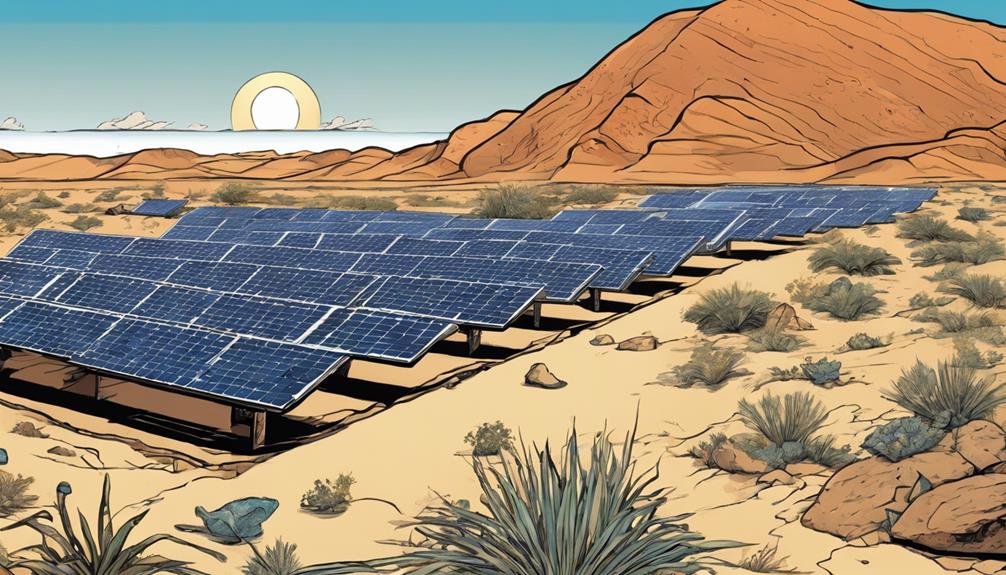
Harness your comprehension of solar energy's potential to drive sustainability efforts.
Solar energy, a renewable resource, plays a vital role in promoting sustainability for both land and water conservation. By utilizing solar power through photovoltaic cells, communities can reduce their carbon footprint and decrease reliance on nonrenewable energy sources.
Solar panels, whether installed on rooftops, open land, or in solar farms, capture sunlight to generate clean, sustainable power, hence aiding in mitigating climate change impacts on Earth's ecosystems.
The utilization of solar energy systems not only decreases greenhouse gas emissions but also contributes to a more environmentally friendly future. With its minimal environmental footprint and renewable nature, solar energy stands out as a key player in promoting sustainability and preserving the delicate balance of Earth's land and water resources.
Embracing solar energy is a significant step towards building a more sustainable and eco-conscious society.
Solar Energy Potential for Electricity Supply

With solar energy's increasing affordability, you can now tap into its potential to power a significant portion of electricity needs on Earth. Here are some key points to bear in mind:
- Solar energy has the capacity to fulfill a substantial part of the world's electricity requirements, offering a sustainable and renewable energy solution.
- The decreasing cost of solar energy makes it a more accessible option for generating electricity, contributing to a greener and cleaner energy mix.
- By utilizing solar energy for electricity supply, the reliance on burning fossil fuels diminishes, aiding in the reduction of greenhouse gas emissions and combating climate change.
- Solar panels can be strategically placed on land or rooftops, minimizing their impact on natural landscapes and preserving land and water resources for future generations.
Harnessing solar energy for electricity supply not only offers a viable solution for meeting our energy needs but also plays an essential role in safeguarding the environment for a sustainable future.
Frequently Asked Questions
How Does Solar Energy Affect the Land?
When you consider how solar energy impacts the land, it's important to focus on minimizing environmental harm through careful site selection. Solar panels on rooftops and unused land reduce the need for large plots, promoting sustainability.
How Does Solar Energy Affect Water?
When it comes to water, solar energy is a game-changer. By using minimal water for operation, solar panels help in conserving water sources and promoting sustainable water management practices, benefitting the environment and future generations.
How Does Solar Energy Affect Life on Earth?
Solar energy sustains life on Earth by providing light and heat for ecosystems. It drives photosynthesis, regulating Earth's climate and water cycle. The Sun's energy influences weather, ocean currents, and biodiversity, supporting environmental stability.
How Does Solar Energy Affect the Hydrosphere?
Solar energy impacts the hydrosphere by driving processes like evaporation, transpiration, and photosynthesis. It warms oceans, influencing currents and weather. Its absorption by water bodies affects aquatic life and nutrient cycling, crucial for marine ecosystems.
What Impact Does Solar Energy Have on Earth’s Land and Water Geography?
Solar energy has a significant geography’s impact on solar placement. The availability of open land and access to sunlight affects where solar panels can be installed. In terms of water geography, solar panels can have minimal impact as they don’t require water for energy production, unlike other forms of power generation.
Conclusion
To sum up, harnessing the power of solar energy is a game-changer for our planet. By reducing greenhouse gas emissions and preserving land and water resources, solar energy is paving the way for a more sustainable future.
So, don't let the grass grow under your feet – join the solar revolution and make a positive impact on the environment today!
